Choosing the best cleaner for vinyl floors is crucial for maintaining their shine, durability, and longevity. Vinyl flooring, with its versatility and aesthetic appeal, has become a popular choice in homes and commercial spaces.
However, to preserve its pristine condition, it requires regular cleaning with products specifically designed not to damage the surface. In this guide, we’ll explore the options for the best cleaner for vinyl floors, helping you make an informed decision to keep your floors looking their best.
Choosing the right cleaner for vinyl floors is not just about maintaining aesthetics; it’s about preserving the unique properties that make vinyl flooring so appealing.
Vinyl stands out for its resilience, water resistance, and ability to mimic the look of more expensive materials at a fraction of the cost.
However, its susceptibility to damage from harsh chemicals necessitates the use of gentle, yet effective, cleaning solutions.
Using the correct cleaner ensures that your vinyl floors remain vibrant, durable, and free from scratches or discoloration, thereby extending their lifespan and enhancing the overall look of your space.
Types of Vinyl Floor Cleaners
Commercial Cleaners
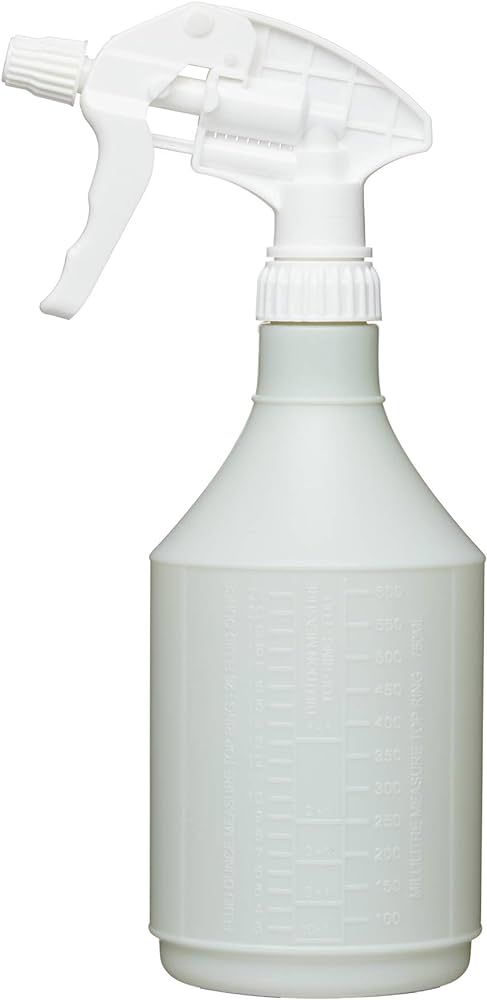
Advantages of Commercial Cleaners
Commercial cleaners designed for vinyl flooring come with several advantages that make them an attractive choice for homeowners and professionals alike. First, these cleaners are specifically formulated to be safe for use on vinyl floors, ensuring they clean effectively without causing any damage.
They often contain ingredients that not only remove dirt and grime but also protect the floor’s surface from future stains and wear.
Additionally, many commercial cleaners are designed for ease of use, coming in convenient spray bottles or ready-to-use formulas that require no dilution, simplifying the cleaning process.
Popular Brands and Products
Bona Hard-Surface Floor Cleaner
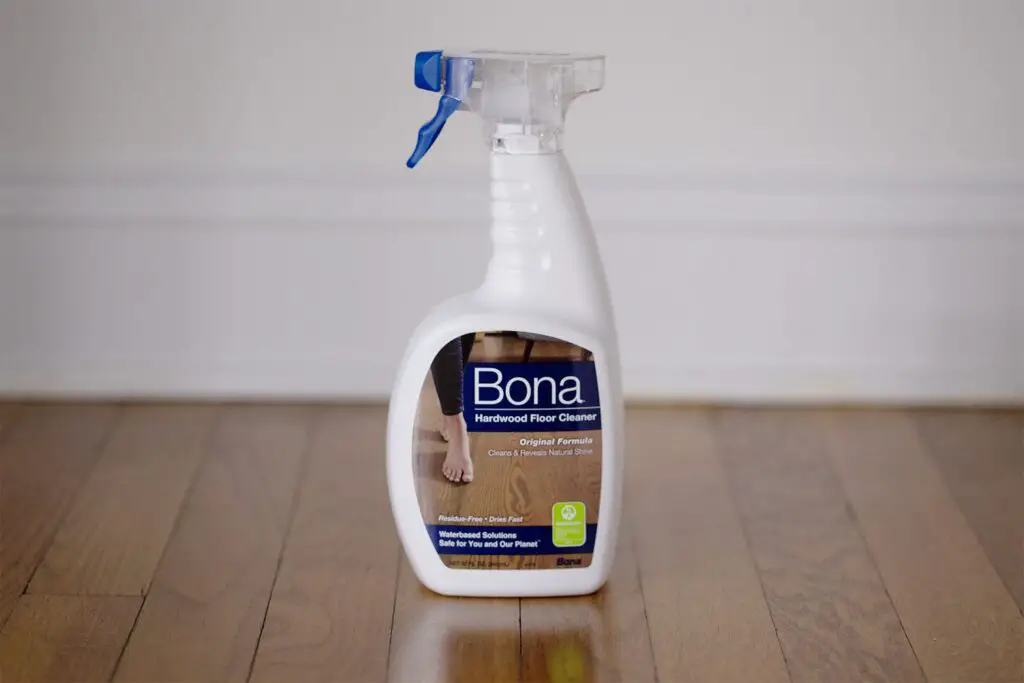
Bona is a well-known brand in the floor care industry, and its Hard-Surface Floor Cleaner is highly recommended for vinyl floors. It provides a streak-free cleaning solution that is pH neutral, meaning it’s gentle enough not to harm your floors while effectively removing dirt and grime.
Rejuvenate Luxury Vinyl Floor Cleaner
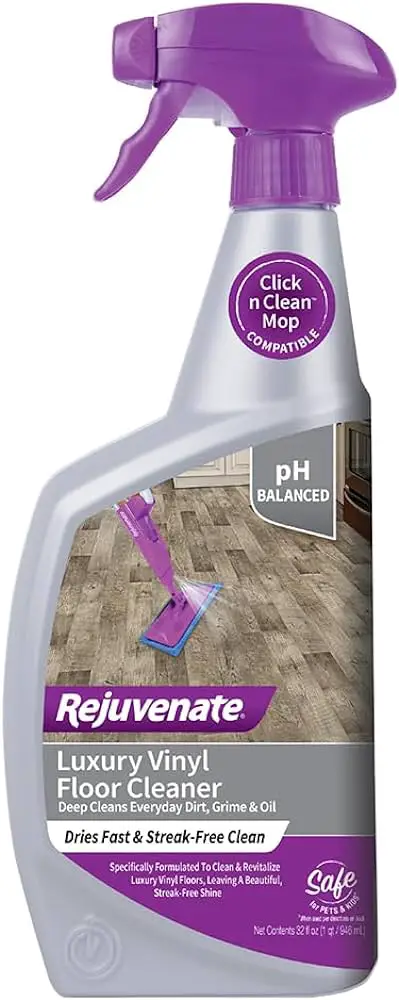
Rejuvenate offers a solution specifically designed for luxury vinyl flooring. Their Luxury Vinyl Floor Cleaner comes in a spray bottle for easy application and does an excellent job of cleaning without leaving behind residues. It’s also noteworthy for its ability to remove tough stains and restore the shine to dull floors.
Armstrong Flooring Once ‘n Done Floor Cleaner
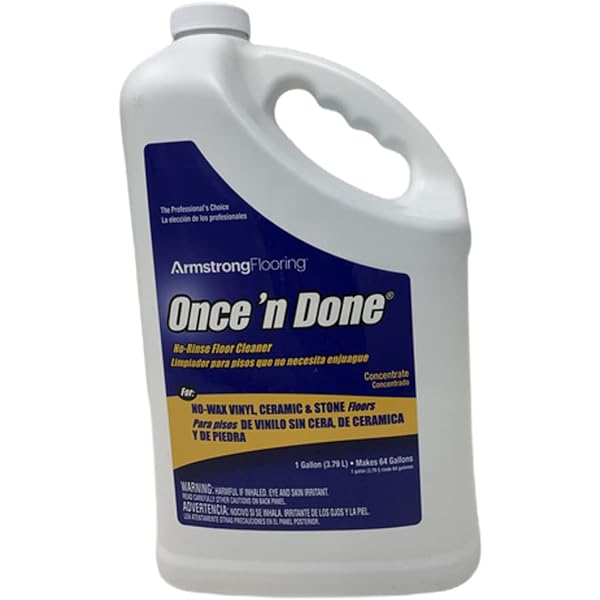
Armstrong is another leading name when it comes to flooring solutions. Their Once ‘n Done Floor Cleaner is intended for no-wax vinyl, ceramic, and stone floors, offering a powerful cleaning action without the need for rinsing. Its formula is tough on dirt but gentle on floors, ensuring longevity and maintaining aesthetics.
By opting for these well-regarded commercial cleaners, you can ensure not only the cleanliness but also the longevity and beauty of your vinyl floors.
Whether you choose Bona for its pH-neutral formula, Rejuvenate for its stain-removing prowess, or Armstrong for its rinse-free convenience, making an informed decision will help keep your floors in top condition.
Natural/Home-made Solutions
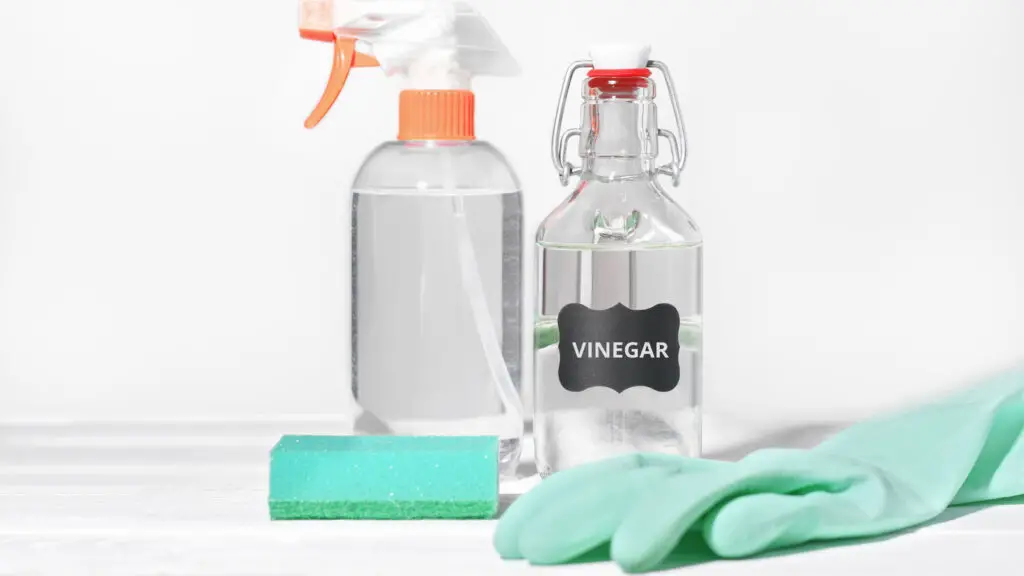
Benefits of Natural Cleaners
One significant advantage of using natural ingredients for cleaning is their eco-friendliness. Unlike many commercial cleaners that contain harsh chemicals, natural cleaners reduce the risk of environmental pollution and minimize your carbon footprint.
They are safer for both the planet and the people living on it, contributing to a healthier home and a healthier ecosystem.
Additionally, natural ingredients often present less risk of causing irritation or adverse reactions for those with sensitivities, making them a preferable choice for households with pets, children, or individuals with allergies.
Recipes for DIY Cleaners
Creating your vinyl floor cleaners can be both cost-effective and environmentally friendly. Here are a few simple recipes:
Vinegar Solution:
Combine one cup of apple cider vinegar with a gallon of hot water for a cleaner that cuts through dirt without leaving a residue. For extra cleaning power, a few drops of dish soap can be added. This solution is ideal for weekly cleaning tasks.
Baking Soda Paste:
For tougher stains, a paste made from baking soda and water can be applied directly to the stain. Leave it on for a few minutes before scrubbing gently with a soft brush and rinsing clean.
Essential Oil Enhancer:
To the vinegar solution, add a few drops of your favorite essential oil. Not only will this add a pleasant scent to your cleaner, but some essential oils like lemon or tea tree oil have natural antibacterial properties.
Factors to Consider
Ingredient Safety
Environmental Impact
When choosing ingredients for DIY cleaners, it’s crucial to consider their environmental impact. Many natural substances, such as vinegar and baking soda, are biodegradable and have minimal adverse effects on wildlife and ecosystems when used in household quantities.
However, some essential oils, though natural, can be harmful to aquatic life if they enter waterways.
Always research and use environmentally safe practices when disposing of any DIY cleaner residues to ensure that our efforts to clean our homes do not contribute to polluting our planet.
Health Considerations (Pets, Children)
Health safety is paramount when selecting ingredients for homemade cleaners, especially in homes with pets and children. Natural ingredients tend to be safer than their chemical counterparts, but it’s important to remain cautious.
Certain essential oils, while beneficial for cleaning and adding a pleasant aroma, can be toxic to cats, dogs, and other pets. Similarly, though substances like baking soda and vinegar are typically safe, they should be used in a way that limits ingestion or direct contact by young children.
Always store your DIY cleaning solutions out of reach of children and pets, and consider any allergies or sensitivities they may have when choosing your ingredients.
Effectiveness
Removal of Different Types of Stains and Dirt
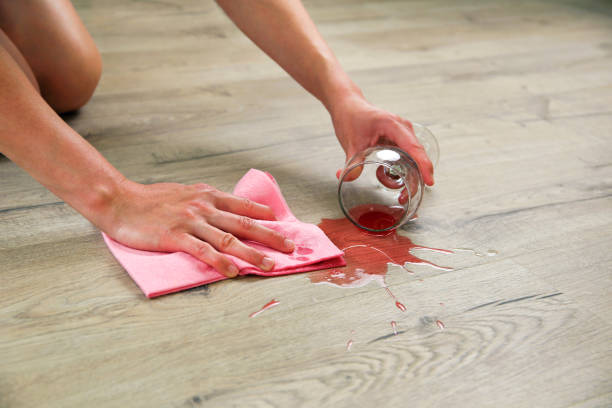
When formulating DIY cleaning solutions, it’s essential to cater to the specific types of stains and dirt you’re dealing with.
For instance, vinegar works exceptionally well for removing soap scum and hard water marks due to its acidity. Baking soda, on the other hand, is great for tackling grease and grime because of its abrasive yet non-scratching nature.
Combining these two can create a versatile cleaner capable of handling a wide range of household stains.
Preservation of Floor’s Shine and Finish
Choosing the right DIY cleaner is crucial for maintaining the integrity and beauty of your floors. For hardwood surfaces, a mild solution made with water and a small amount of mild dish soap can clean effectively without stripping the wood’s natural oils.
For tiled or laminated flooring, a mixture of vinegar and water can eliminate dirt without leaving a dull residue.
It’s important to avoid using overly acidic or abrasive ingredients on sensitive surfaces to preserve your floor’s shine and finish.
Cost
Price Comparison
The immediate cost benefit of DIY cleaning solutions as compared to commercial products is quite significant.
Most DIY ingredients like vinegar, baking soda, and lemon are pantry staples, making them readily available and cheaper than most specialized cleaning products.
While commercial cleaners often come with a higher price tag due to branding, marketing, and packaging costs, the raw materials for homemade cleaners are minimal, leading to substantial savings over time.
Long-term Value
Investing in DIY cleaning solutions not only offers immediate financial savings but also contributes to long-term value.
By customizing the ingredients to suit specific cleaning needs and preferences, consumers can avoid the chemical wear-and-tear on surfaces that some harsh commercial cleaners may cause, thus extending the life of household items and surfaces.
Furthermore, the reuse of containers for homemade solutions supports environmental sustainability, adding an invaluable aspect to the overall worth of DIY cleaning practices.
Application Tips for Best Results
Dilution Ratios
Proper dilution is crucial for both the efficacy of cleaning agents and the preservation of flooring materials. Commercial solutions often come with detailed instructions, which should be followed meticulously.
For natural solutions, a typical ratio of one part vinegar to ten parts water is recommended for most floors, adjusting as necessary for the level of cleaning required.
Tools and Techniques
The right tools can make a significant difference in cleaning effectiveness and efficiency. Microfiber mops and cloths are recommended for their ability to attract and hold dirt and dust.
For textured tiles, a soft-bristle brush can be used to remove grime without scratching the surface. Always use gentle, circular motions to avoid damage.
Cleaning Frequency
Regular maintenance is key to the longevity of your floors. High-traffic areas may require daily sweeping or vacuuming to remove debris, with a deeper clean using appropriate solutions weekly.
Less frequently used spaces might need only bi-weekly attention to stay in optimal condition.
Related Topics:
Top 5 Recommended Cleaners for Vinyl Floors
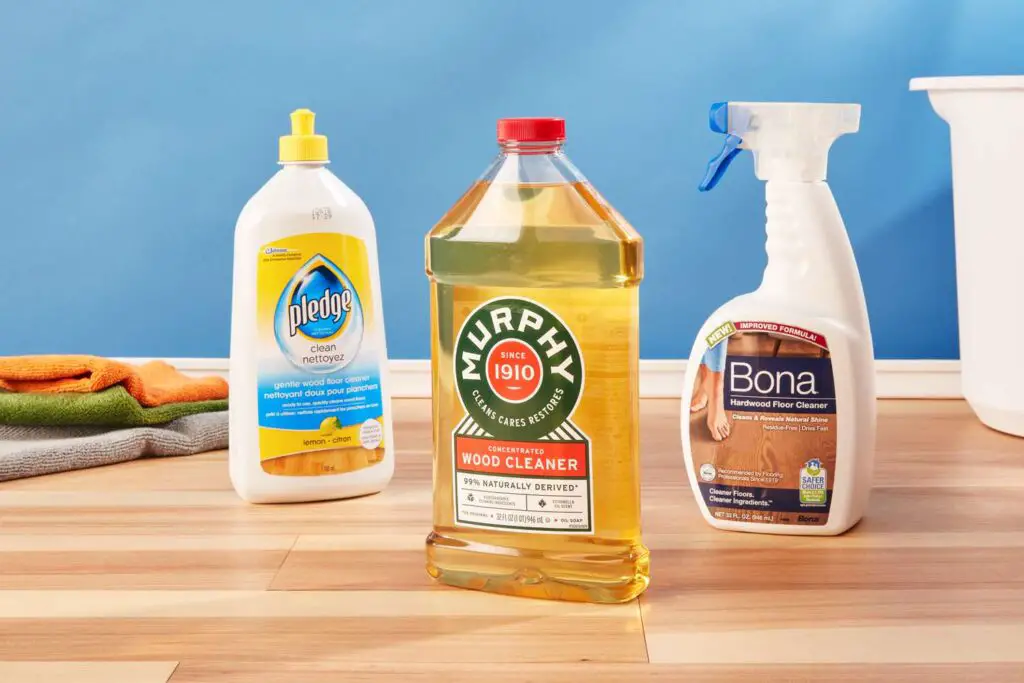
Product Reviews
When selecting the best cleaners for vinyl floors, five products stand out due to their effectiveness, safety, and ease of use.
Bona Hard-Surface Floor Cleaner:
Bona’s formula is renowned for its quick-dry feature and residue-free finish, making it a top choice for homeowners. Its gentle composition is safe for pets and children, which adds to its appeal. However, some users have noted it may not be as effective on tougher stains.
Rejuvenate All Floors Cleaner:
This cleaner is praised for its versatility across various floor types, including vinyl. Its powerful grime-fighting action doesn’t leave behind streaks, offering a pristine finish. The slightly higher cost compared to others may deter some buyers.
Method Squirt + Mop Hard Floor Cleaner:
Method’s plant-based formula is eco-friendly and smells fantastic, with various scents available. While it performs well on everyday messes, it might struggle with more stubborn stains.
Armstrong Flooring Once ‘n Done Floor Cleaner:
Specifically designed for no-wax vinyl floors, Armstrong’s solution cleans without leaving a residue and requires no rinsing. Though highly effective, its chemical scent may not be appealing to all.
Better Life Naturally Dirt-Destroying Floor Cleaner:
With its natural ingredients and pleasant scent, Better Life offers an effective clean without the use of harsh chemicals. It’s particularly good for families looking for eco-conscious cleaning solutions, though its performance on heavy dirt can vary.
In comparison, while each product has its strengths, Bona Hard-Surface Floor Cleaner stands out for general use due to its balance of safety, efficiency, and cost-effectiveness.
For those prioritizing eco-friendly options, Method Squirt + Mop and Better Life Naturally Dirt-Destroying cleaners are excellent choices, albeit with some limitations on heavy stains.
Pros & Cons
Rejuvenate All Floors Cleaner
Pros: Versatility across floor types; leaves no streaks.
Cons: Higher price point; may not be as effective on tough stains.
Method Squirt + Mop Hard Floor Cleaner
Pros: Eco-friendly, plant-based formula; available in various scents.
Cons: Struggles with stubborn stains.
Armstrong Flooring Once ‘n Done Floor Cleaner
Pros: Cleans without leaving residue; no need to rinse.
Cons: Unpleasant chemical scent.
Better Life Naturally Dirt-Destroying Floor Cleaner
Pros: Natural ingredients; safe for families.
Cons: Performance varies on heavy dirt.
Conclusion
Finding the right cleaner for vinyl floors can significantly impact both the appearance and longevity of your flooring. The Rejuvenate, Method Squirt + Mop, Armstrong, and Better Life cleaners each offer unique benefits tailored to different needs, from eco-friendliness to no-rinse formulas.
Particularly, for those prioritizing the care of vinyl floors, choosing a product that balances effectiveness with safety, like the Bona Hard-Surface Floor Cleaner, proves essential.
In navigating the myriad of options available, it’s crucial to prioritize cleaners that not only preserve the aesthetic of vinyl flooring but also contribute to a healthier and safer living environment.
FAQs
Can I use vinegar and water to clean my vinyl floors?
Yes, a solution of vinegar and water can be an effective, eco-friendly option for cleaning vinyl floors. However, it’s important to use it sparingly, as excessive moisture can damage the flooring over time.
How often should I clean my vinyl flooring to maintain its appearance?
It’s recommended to sweep or vacuum daily and mop weekly using a cleaner appropriate for vinyl flooring. This routine helps maintain the floor’s appearance and prevent dirt accumulation.
Are steam mops safe to use on vinyl floors?
Generally, it’s advisable to avoid using steam mops on vinyl flooring. The intense heat can cause the vinyl to warp or planks to separate. Always check the flooring manufacturer’s guidelines before using a steam mop.

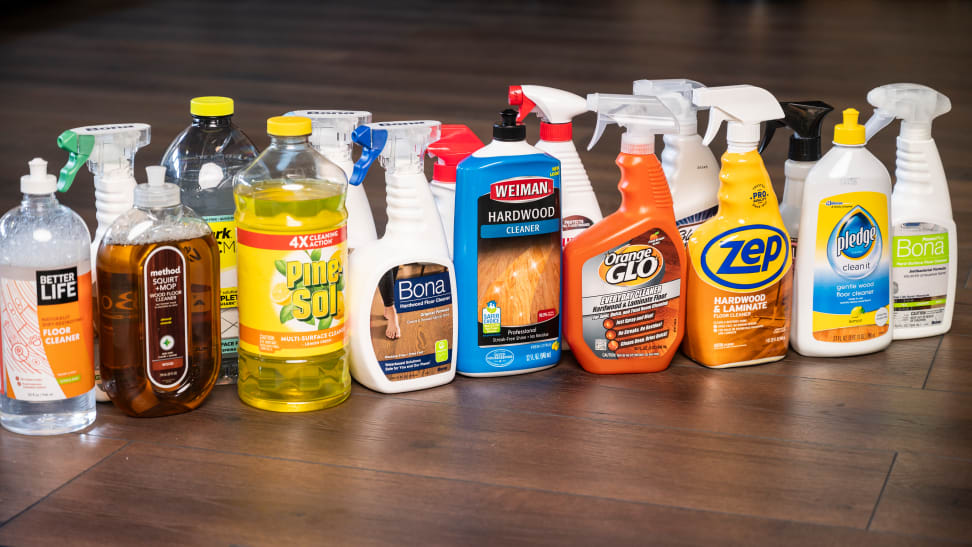
1 thought on “Best Cleaner For Vinyl Floors: Factors to Consider”